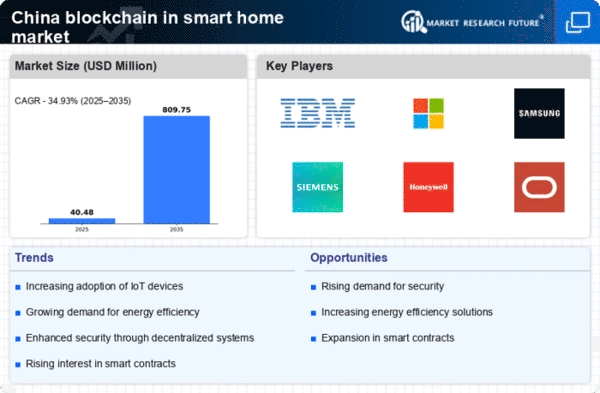Advancements in IoT Technology
The rapid advancements in Internet of Things (IoT) technology are a crucial driver for the blockchain in-smart-home market. As IoT devices become more sophisticated and interconnected, the need for secure and efficient communication protocols becomes paramount. Blockchain can facilitate this by providing a secure framework for device interactions, ensuring that data exchanged between devices is tamper-proof and reliable. In China, the number of IoT devices is expected to exceed 1 billion by 2025, creating a vast ecosystem where blockchain can play a vital role. This growth presents opportunities for innovative applications that leverage blockchain to enhance the functionality and security of smart home devices, thereby attracting more consumers to adopt these technologies.
Government Initiatives and Support
Government initiatives aimed at promoting smart home technologies significantly influence the blockchain in-smart-home market. The Chinese government has been actively encouraging the development of smart cities, which inherently includes smart home solutions. Policies and funding aimed at technological innovation are likely to foster an environment conducive to blockchain adoption. For instance, the government has allocated substantial resources to research and development in the Internet of Things (IoT) and blockchain technologies. This support not only enhances the infrastructure necessary for smart homes but also encourages private sector investment. As a result, the blockchain in-smart-home market is expected to benefit from increased collaboration between public and private entities, leading to innovative solutions that address consumer needs.
Growing Concerns Over Data Privacy
Concerns regarding data privacy and security are becoming increasingly prominent in China, driving the blockchain in-smart-home market. With the proliferation of smart devices, the amount of personal data being collected has raised alarms among consumers. Blockchain technology offers a potential solution by providing a decentralized and secure method for data management. This technology can ensure that user data is encrypted and only accessible to authorized parties, thereby enhancing consumer trust. As awareness of data privacy issues grows, consumers are likely to seek smart home solutions that incorporate blockchain to safeguard their information. This trend suggests a significant opportunity for companies that can effectively integrate blockchain into their smart home offerings, potentially capturing a larger market share.
Increased Focus on Energy Efficiency
The growing emphasis on energy efficiency in China is driving the blockchain in-smart-home market. As energy costs rise and environmental concerns become more pressing, consumers are increasingly seeking solutions that can help them manage their energy consumption effectively. Blockchain technology can facilitate energy management by enabling peer-to-peer energy trading and providing transparent tracking of energy usage. This capability allows homeowners to optimize their energy consumption and potentially reduce costs. The Chinese government has set ambitious targets for energy efficiency, which aligns with the adoption of smart home technologies that utilize blockchain. As a result, the blockchain in-smart-home market is likely to see increased investment and innovation aimed at developing energy-efficient solutions.
Rising Demand for Smart Home Solutions
The increasing demand for smart home solutions in China is a pivotal driver for the blockchain in-smart-home market. As urbanization accelerates, more households are adopting smart technologies to enhance convenience and efficiency. According to recent statistics, the smart home market in China is projected to reach approximately $60 billion by 2025, indicating a robust growth trajectory. This surge in demand creates a fertile ground for blockchain technology, which can provide secure and transparent transactions among various smart devices. The integration of blockchain can facilitate seamless communication and data sharing, thereby enhancing user experience and trust in smart home systems. As consumers become more tech-savvy, the expectation for advanced security and interoperability among devices further propels the adoption of blockchain solutions in this sector.

















